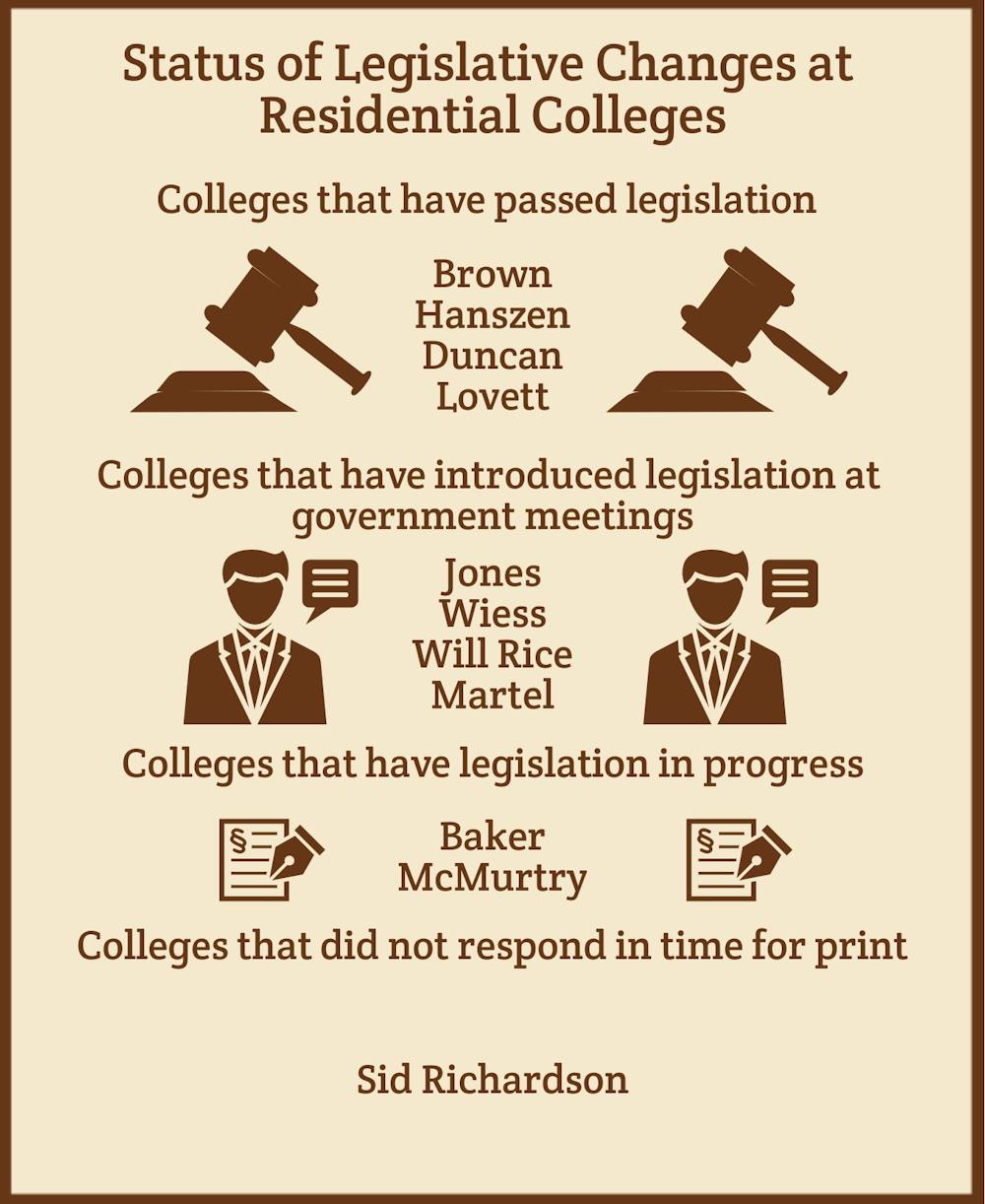Colleges introduce leadership restrictions

Several colleges have already added or are in the process of adding variations of a constitutional bylaw to create a formal process that prevents students on disciplinary probation from running for leadership positions, according to Hanszen College President Landon Mabe.
Students on disciplinary probation by Student Judicial Programs are already not allowed to run for any leadership positions in university-sponsored organizations, such as the Peer Academic Advising program, according to the Code of Student Conduct. However, a formal mechanism to enforce this has been missing at the residential college level, according to Mabe, a senior. Because Student Judicial Programs decisions are confidential, students serving as college election representatives do not have the ability to verify candidates’ eligibility.
According to Mabe, the Hanszen bylaw would ensure that students on probation would not be able to run for a position. Candidates would have to submit their intent to run to the college coordinator or magisters, who would then send the list of names to SJP to verify their eligibility. Brown College and Lovett College also use this system in their legislation.
The details of the proposed process vary from college to college, but the purpose of preventing students on probation from running for leadership positions is the same, according to Mabe.
Brown was the first to pass such legislation. Brown President Frances Williamson said Brown created a working group last year to write the bylaw, and this group worked with SJP and the Title IX office during the drafting process.
According to Williamson, Brown’s bylaw passed Sept. 24 at the biweekly cabinet meeting.
“We were happy to work with Brown as they drafted accurate and thoughtful language regarding student leadership eligibility,” Emily Garza, director of SJP, said. “If other colleges are considering adopting similar bylaws, I would encourage them to reach out to our office to ensure that their actions are consistent with the Code of Student Conduct and any other policies that might speak to this issue.”
Wiess College President Tim Thomas II said that the legislation was introduced at their cabinet meeting two weeks ago, following Brown’s development of the legislation.
“We have a part of [our] constitution that says students aren’t allowed to be on probation, but nothing in the bylaws that says this gets verified by SJP, which is what will be added,” Thomas, a junior, said.
Mabe said that all colleges are working to implement a form of this bylaw, if the college has not already.
Hanszen passed this bylaw in September, according to Mabe. Amendments to Hanszen’s election code require a three-fourths vote of the cabinet or three-fourths vote of the college if half of the students participate.
Duncan College and Lovett passed amendments last week implementing similar procedures, according to Lovett President Chloe Oani and legislation provided by Duncan President Louis Cole.
Other colleges are in the process of implementing changes to their bylaws. In addition to Wiess, Jones College is currently in the process of introducing amendments to its constitution but has not passed any legislation yet, according to Jones President Kyle Bartsch, and Will Rice College introduced an amendment last Wednesday, according to Diet minutes.
Mabe said the changes arose out of a wider campus conversation about having perpetrators of sexual assault in leadership positions.
“We started looking into this change at the behest of students who were vocal about barring students from running for office who were found in violation of Rice’s sexual misconduct policy,” Mabe said.
Because students on disciplinary probation are already barred from running for positions, these new bylaws do not change SJP’s process. The Code of Student Conduct states that students may not run for or hold positions in university organizations while on disciplinary probation. According to Garza, this stipulation has always been enforced directly with students on disciplinary probation. When a student is put on probation, they are required to resign from leadership positions, according to Garza.
“We often have various staff members from different departments on campus contact our office and ask if a particular student would be eligible to hold a certain position in an organization that is affiliated with that office [or department],” Garza said. “If the student is on disciplinary probation, then our answer to that staff member would be that the student is ineligible.”
More from The Rice Thresher

Over 1,000 students petition against new meal plan
When Konstantin Savvon opened the Housing and Dining email announcing the new unlimited meal plan, he was instantly concerned about the impact on off-campus students like himself.

Rice football wins season opener under new coach
For the first time since 2018, Rice football opened its season with a victory. Scott Abell was soaked with yellow Powerade following a 14-12 win on the road Saturday against the University of Louisiana at Lafayette, which won 10 games and made it to the Sun Belt Conference championship last season.

Acting like an athlete: Rice basketball alum takes on Broadway
Underneath Chadd Alexander’s Broadway costume, there’s ankle tape and wrist braces — same protective gear he wore as a walk-on basketball player at Rice, though now he’s performing eight shows a week in the ensemble of “Harry Potter and the Cursed Child” instead of running conditioning drills in Tudor Fieldhouse.

Please note All comments are eligible for publication by The Rice Thresher.